The science of cooking: an introduction
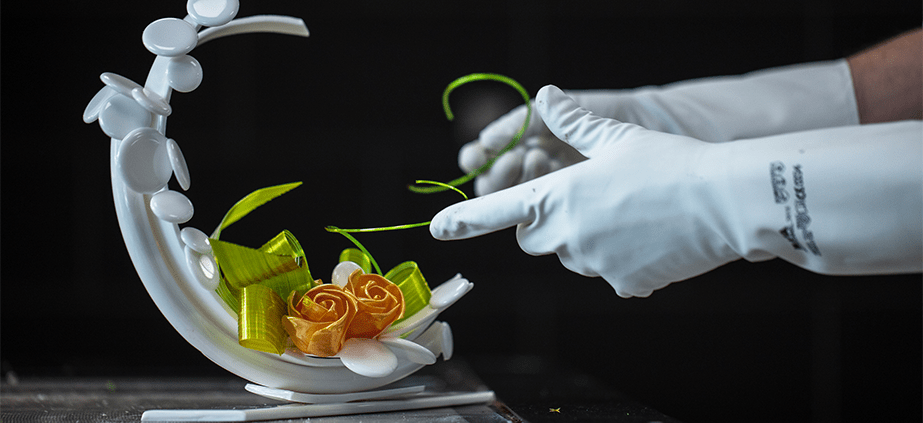
There can be much debate over whether cooking is a science or an art. While culinary arts are definitely worthy of being called art, there are also plenty of scientific principles that are important to understand in order to finesse your cooking. Whether you want to be able to perfect your technique for sautéing scallops or you wish to know how fermentation works, science has the answers, useful for everything from modern cuisine to traditional dishes.
In this article, we'll go over the basics of how science can help with your approach to cooking, as well as which scientific fields can teach us about cooking. Plus, we'll go over how you can learn all the cooking science skills you need to make a good start to your culinary career.
Is there a science behind cooking?
When you look into it, cooking is heavily rooted in science. Of course, there are many different ways to apply the scientific principles that help make food delicious (and safe to eat), so there is a lot to learn for culinary careers. Everything from baking to marinating to currently balancing flavors all depends on science. In fact, there are ways that physics, chemistry, and biology all play into our approach to cooking and can help us develop advanced cooking techniques.
What is the study of cooking food called?
The study of cooking and food preparation can be described in many ways. One of the broadest labels is the culinary arts, which covers everything from preparing food to presenting and serving it. The science of cooking is also sometimes called molecular gastronomy. This includes all the details about how heat, cold, acids, or other ingredients affect food.
What do chefs have to study?
Different restaurants, caterers, and employers will have a range of qualification requirements for their chefs. However, there are many essential subjects that chefs need to know. When you are studying to be a chef, you should work on building a wide range of different skills, including:
- Food hygiene
- Cookery skills
- Creativity
- Time management
- Teamwork
- Resilience
- Communication
If you want to work in a position where you are managing other chefs, such as in a role like head chef or executive chef, you will also need to learn skills such as:
- Team leadership
- Organization
- Business and budgeting
You can learn all of these skills by finding the right culinary arts degree that will give you a mix of culinary techniques as well as management skills.
World-class culinary arts degrees from Ecole Ducasse This Bachelor's degree combines hands-on culinary skills with business knowledge and professional internships to give you all the skills and knowledge that a chef needs.
Do chefs study food science?
While not all chefs study food science as a subject, most chefs will have a good idea of elementary food science, and various ways that a scientific approach can improve their cooking. You can be sure that many top chefs in high-end restaurants know about food science, especially if they use advanced cooking techniques. After all, this can be an exciting source of ideas for creating new dishes or practical help in areas such as the best ways to tenderize proteins.
Even if culinary arts courses don't advertise that they teach culinary science, you should look into the course description, as several do teach the cornerstones of science and cooking.
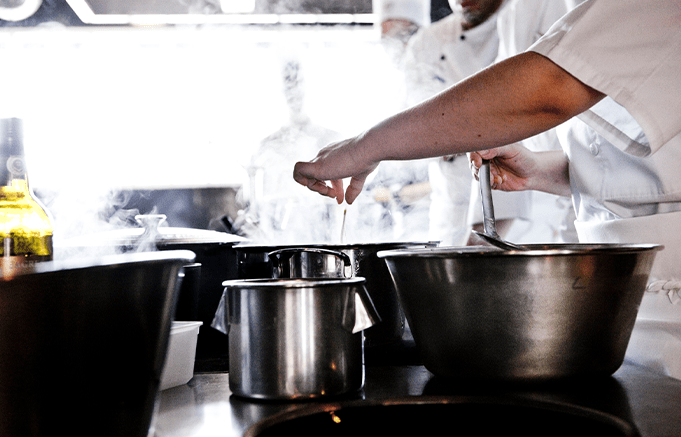
How does a chef use chemistry?
Chemistry is all about reactions between different chemical components. This scientific approach is actually fundamental to the very nature of cooking, especially when baking, so there can be a lot of culinary chemistry to learn.
Understanding the chemical reactions that take place in food during cooking
One of the most important chemical reactions that occur during cooking is the Maillard reaction. This is what happens when you heat food and it browns on the outside. In the Maillard reaction, the heat allows amino acids to react with reducing sugars. This gives browned food its distinctive rich and slightly sweet or caramelized taste. If you've always heard that you should brown food before cooking all the way through, this is one of the main reasons why.
The role of heat, acid, and enzymes in cooking
Of course, there are other chemical reactions that happen with food and here are two to consider:
- Heat and enzymes: Heat breaks down enzymes such as proteins. This is called denaturing, and it's why egg whites turn solid and white when you cook them. Without this reaction, many foods wouldn't have their distinctive "bite" when you eat them.
- Acid and proteins: If you've ever marinated chicken in lemon juice, you'll see it changes. This is because the acid starts to attack and break down the proteins in the meat and makes the meat tender. But this doesn't work with vegetables.
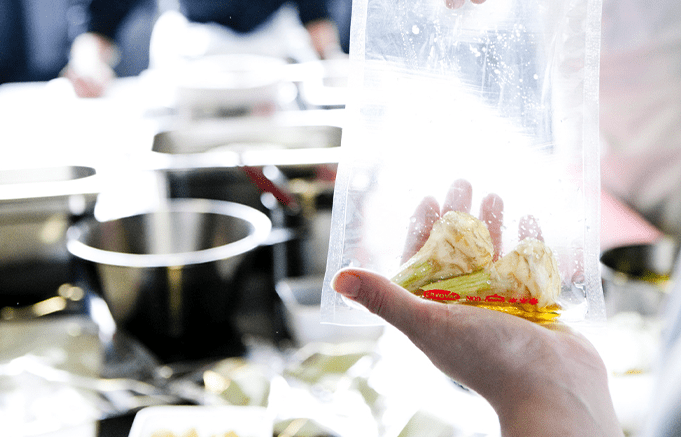
The physics of cooking
Physics concerns the structure of matter and energy transfer between different things. While you probably won't need to know thermodynamics for cooking, there are still a few useful things to know about the principles of heating and cooling.
The principles of heat transfer and how they apply to cooking
You might wonder why there are so many different ways to cook food. If we want to warm ingredients, surely any way would work? In fact, many different methods are used because of the way heat transfer works. You need to know different times to use different types of heating techniques. The types of heating are:
- Conduction: direct contact with a heat source, such as in a cooking pan. This is generally directional, and it helps you sauté scallops or sear steak, for example. Convection: heat transfer via air or water. This happens in an oven and is more even in nature, meaning your roast beef gets warmed all the way around.
- Radiation: electromagnetic waves carrying heat, such as in a microwave, penetrate food, making it a more unpredictable heat type. In more extreme circumstances, radiation can heat air or liquid pockets in food and make them explode.
The importance of temperature control in cooking
One of the big reasons we cook food is, obviously, to make sure it is safe to eat. This is because we need to kill any pathogens or parasites such as bacteria in the food. Poor cooking methods can lead to problems with raw chicken spreading salmonella, raw pork spreading worms, and other food issues. Temperature control is vital to make sure that food is safe. For example, chicken breast meat needs to reach at least 165 degrees Fahrenheit (74 degrees Celsius) to be safe.
Of course, we also want to make sure that food is heated to a suitable temperature to be pleasant to eat. We've already mentioned how proteins denature with heat. The problem is, if you overheat food and it denatures too much, you might be left with something unappetizing. That same chicken breast, at 190 degrees Fahrenheit (88 degrees Celsius), could be very chewy and tough to eat. At higher temperatures, it would even blacken and lose its moisture.
So, we can see that temperature control is a vital part of cooking. This is, of course, an example of how physics intersects with the culinary arts.
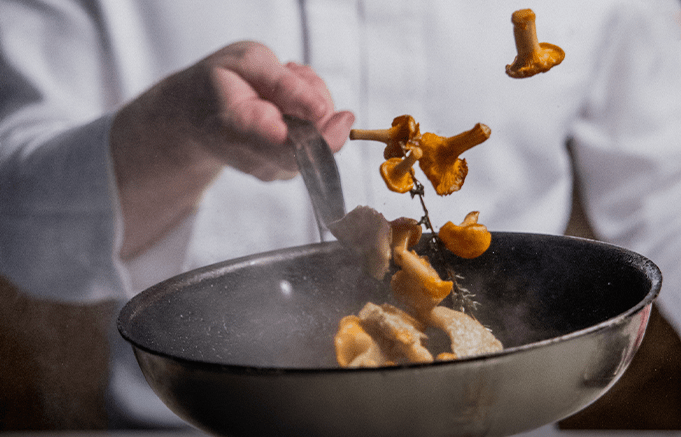
The biology of cooking
Biology, being the study of living things, obviously has a lot to add to the culinary world and modern cuisine. Almost everything we eat was alive at some point, and we need nutrients to stay alive ourselves.
The role of microorganisms in fermentation and preservation
Fermentation is an important element of food preparation, in making alcohol, sauces, and bread. Preservation is another technique that can draw on this. These procedures require the right microorganisms. Fermentation happens when these organisms release carbon, which is a reaction you can control with some knowledge of biology and knowing the right microorganisms, the right temperatures, and the right amount of sugars to add.
The impact of cooking methods on the nutritional value of food
It's important to know how different cooking methods will affect the food you're cooking. Certain types of heating can render food inedible and destroy its nutrients. Knowledge of biology and different biological reactions can help ensure that you cook food in a way that doesn't make it lose its nutritional value.
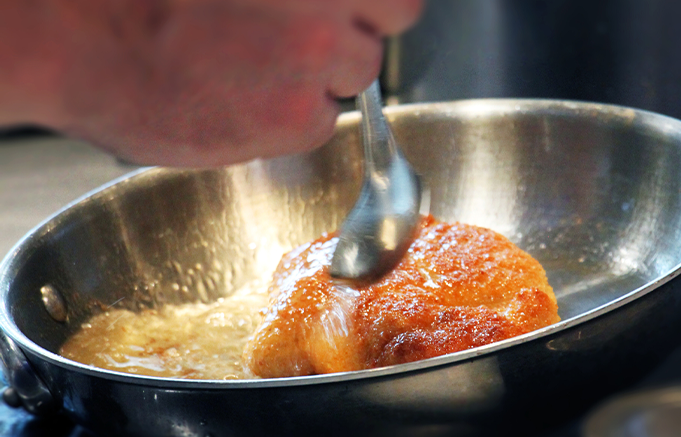
Studying the science of cooking
If you want to gain some important skills to boost your career as a chef, you should find a course that includes the science of cooking.
There are plenty of reasons to study the culinary arts, and it's one of the main routes to becoming a professional chef. If you are interested in pursuing a culinary degree, consider studying at a culinary school in France, a country with rich culinary traditions and renowned culinary schools.
Build culinary skills and entrepreneurial expertise
Learn everything you need to start moving towards a career in food science or the culinary arts in this intensive practical course.
If you're unsure if being a chef is the right career path for you, or if you want to learn more about what you can do with a culinary degree, read our blog posts. If you're ready to start exploring the potential of a culinary career, get in touch today to find out more about our study options.


